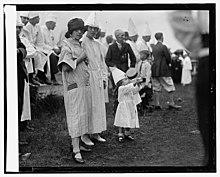
Women of the Ku Klux Klan (WKKK), also known as Women's Ku Klux Klan, and Ladies of the Invisible Empire, held to many of the same political and social ideas of the KKK but functioned as a separate branch of the national organization with their own actions and ideas. While most women focused on the moral, civic, and educational agendas of the Klan, they also had considerable involvement in issues of race, class, ethnicity, gender, and religion.[1] The women of the WKKK fought for educational and social reforms like other Progressive reformers but with extreme racism and intolerance.[2]
Particularly prominent in the 1920s, the WKKK existed in every state, but their strongest chapters were in Ohio, Pennsylvania, Indiana, and Arkansas. White, native-born, Protestant women over age 18 were allowed to join the Klan. Women of the Klan differed from Klansmen primarily in their political agenda to incorporate racism, nationalism, traditional morality, and religious intolerance into everyday life through mostly non-violent tactics.[3]
- ^ Feldman 2003, p. 25.
- ^ Hill, Jackie (2008). "Progressive Values in the Women's Ku Klux Klan". Constructing the Past. 9 (1).
- ^ Blee, Kathleen M (1991). Women of the Klan. University of California Press. p. 107. ISBN 0-520-07876-4.